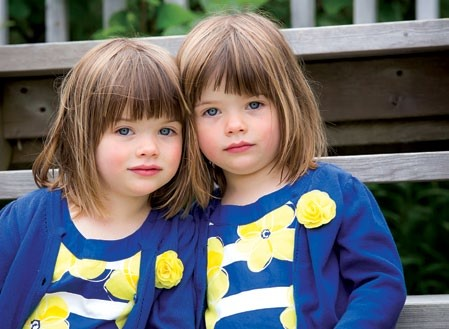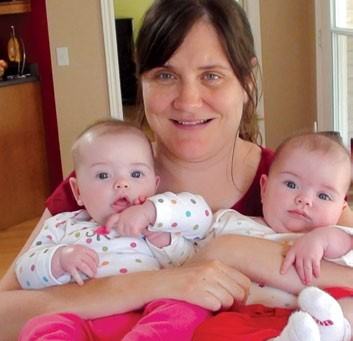A woman falls into depression after becoming paralysed. But she picks herself up, finds love and has kids.


A woman falls into depression after becoming paralysed. But she picks herself up, finds love and has kids.

Sandra Burton was an active sportsloving teenager. The 17-year-old – an attractive brunette with blue eyes – enjoyed biking, skiing, camping and swimming. One night at a party at a friend’s house changed the course of her life.
Things got out of hand after some drunk young men crashed the party. For kicks, they threw people in the pool. They took a look at Sandra, and she went next. One boy picked her up and tossed her into the shallow end of the pool, but the experienced swimmer landed on her feet seconds later.
Her boyfriend came up from behind, picked her up and threw her back in. “I landed where the pool bends towards the deep end, on my spine. I knew that I couldn’t swim because my arms wouldn’t move,” recalls Sandra, now 41.
With her body floating face down, friends rushed to pull her out. “I wasn’t angry because I knew he (her boyfriend) was just horsing around,” says Sandra. She drifted in and out of consciousness as the ambulance drove her to Sunnybrook Hospital in Toronto, Canada.
“A neurosurgeon said I’d never walk again, and I’d probably never use my arms again. It didn’t fully sink in. I dismissed it. I thought I’d get better, beat the odds and walk away unscathed,” she said.
In counselling for two years, she grieved her loss of movement and lack of freedom, trying to confront her fears and anxieties of an uncertain future. She bravely fought back sadness and depression, yet it was always just under the surface of her emotions.
“My independence was gone. I could only shrug my shoulders, move my biceps and bend my wrists. My fingers remained curved and locked in place – until this day.”
Needing 24-hour medical care, she moved to a residence one and a half hours away from home. She needed assistance to get up from bed, shower, dress, eat, exercise, and go back to bed. When she filed a lawsuit one year after the accident, her boyfriend and high school buddies turned away in resentment.
OVERCOMING ADVERSITY
Determination and perseverance helped her cope. “No matter how down I was, I knew I had to drag myself out of it, had to keep going,” she said. “My family was a huge support and if I was depressed it hurt them too, so I tried my best not to sink deeper into depression.”
Sandra set short-term goals. In 1992, one year after the accident, she learned to drive a specially equipped all-hand controlled blue SUV that gave her an appreciable measure of independence and freedom. “It was my first real feeling of success,” she said.
She dreamed big. As a young girl, she knew she wanted to make her mark working with children, setting standards that would inspire others. She just didn’t know how to accomplish it. Then at age 38, she made headlines worldwide by becoming one of the known quadriplegics to give birth to twins.
“They’re more than I could have ever hoped for,” she said. “I don’t look back to lament my fate. I’m happier than I’ve been in a long time.”
But as with most things in Sandra’s adult life, nothing came easy. Before motherhood, there was college. She earned a Master’s Degree in speech pathology from the University of Western Ontario and worked for five years with preschoolers with speech and language delays.

LOVE & MARRIAGE
Sandra dated a few times in graduate school, but never seriously. At age 32, she signed up for a horticultural class resembling a group therapy session. Of the 20-odd students in class, in came a man in his mid-30s, dressed in a T-shirt who sat crossed-legged in flip-flops. His name was Frank Wheeler, recently divorced and a father of two from Newfoundland, Canada.
After class, several students gathered for dinner and card-playing. Meeting after school became routine, even after class disbanded. They both enjoyed the outdoors, trail hiking, the movies and health food.
“One day, he asked me to go camping with him. I said ‘no’,” she remarked.
“He asked why and I told him he’d have to help me get dressed, go to the bathroom and do everything,” she explained.
“So what! Don’t be silly,” he answered, yet Sandra was adamant. He went home and looked up on the Internet what life is like for those with spinal cord injuries. Three years later they were married. By then Sandra was 35.
“I was in awe how he treated me,” she said. “If I tell someone how much help I need, they’d normally run the other way. Not Frank. He never treated me differently because I’m in a wheelchair. It’s like he doesn’t see the chair.”
Growing up with four siblings, she dreamt of having children of her own.
“I knew I could have kids, but that there was a big risk,” she said. “I can’t feel pain, the contractions of labour. If my blood pressure went up and I didn’t realise it, I could have had a stroke,” she said. “What I didn’t know was how difficult the cesarean would be. It was above the navel, near the heart and lungs so there was enormous bleeding. I told myself that I’m only going to go through this once. It was worth it.”
With Frank, who’s 43 today, by her side, Sandra cried when she first saw the girls, whom she named Emma and Megan.
“I thought my dream came true,” said Sandra. “I finally have two daughters. I love seeing them grow. They have each other and siblings are important to me.”
CHALLENGES AS A MOTHER
Caring for twins was challenging from the start. Sandra’s arms had to be propped up with pillows so her hands could be positioned to feed them. Her mum stayed for three weeks to help care for them. After that, she hired a nanny.
While the twins were babies, Sandra fed and cuddled them in her arms. As infants, cushioned chairs were attached to her wheelchair so she could read or talk to them. When they started crawling, she laid on the floor to be on their level.
Now three and a half years old, the twins feed themselves. “But I do everything I can: Discipline them, pick them up from school, drive them to swim class, go on walks together, help brush their hair and hug them.”
Sandra explained that she’s in a wheelchair because she hit her head in a pool and now her legs don’t work. “They don’t fully comprehend it,” she realises, because they’ve invited her to play with them in the pool.
Both her daughters are spunky, yet sweet, caring and helpful with personalities similar to their parents. Like Sandra, Emma is shy, cautious and will observe something for a long time before trying it. Megan resembles her father in that she’s more adventurous.
Sandra said that motherhood brought “purpose” to her life. While she believes she’s lived her life to the fullest “and achieved my goals”, she hopes to return to college to learn how to counsel those afflicted by traumas.
“The girls have brought much happiness,” she said. “They’ve motivated me through rough times. Yes, I still have rough days, but I’m more grounded, more at peace. I love being a mother. It’s more than what I imagined.”

























